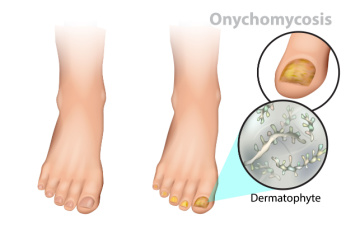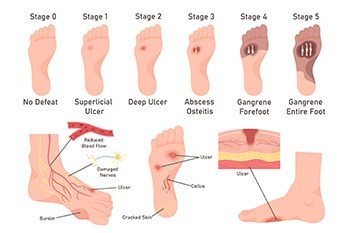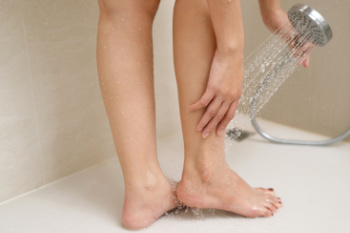Connect With Us
Blog
Items filtered by date: September 2024
We Can Treat Your Foot or Ankle Pain
Understanding Toenail Fungal Infections in Children

Fungal toenail infections in kids, also known as onychomycosis, occur when fungi grow in or under the nail, leading to discoloration, thickening, and brittleness. These infections thrive in warm and moist environments, making locker rooms, public pools, and tight-fitting shoes common sources of exposure. Children with weakened immune systems or those prone to athlete’s foot are more susceptible to fungal infections. If your child develops a fungal toenail infection, maintaining proper foot hygiene is essential. Keep their feet clean and dry, and ensure they wear breathable shoes and change socks regularly. If your child’s toenail becomes painful or if multiple nails are affected, it is suggested that you consult a podiatrist.
For more information about treatment, contact Scott Amoss, DPM of Advanced Foot & Ankle Specialists. our doctor can provide the care you need to keep you pain-free and on your feet.
Toenail Fungus Treatment
Toenail fungus is a condition that affects many people and can be especially hard to get rid of. Fortunately, there are several methods to go about treating and avoiding it.
Antifungals & Deterrence
Oral antifungal medicine has been shown to be effective in many cases. It is important to consult with a podiatrist to determine the proper regiment for you, or potentially explore other options.
Applying foot powder on the feet and shoes helps keep the feet free of moisture and sweat.
Sandals or open toed shoes – Wearing these will allow air movement and help keep feet dry. They also expose your feet to light, which fungus cannot tolerate. Socks with moisture wicking material also help as well.
If you have any questions please feel free to contact our offices located in Whiting and Toms River, NJ . We offer the newest diagnostic tools and technology to treat your foot and ankle needs.
Possible Causes of Big Toe Pain

Sharp pain in the big toe can be distressing and may arise from several conditions. Gout, a type of arthritis caused by uric acid crystals, often leads to sudden, intense pain in the big toe joint. Another common cause is bunions, which create a painful bump at the base of the toe due to misalignment. Turf toe, an injury from hyperextending the toe, can also cause sharp pain. Other potential issues include sesamoiditis, an inflammation of the small bones beneath the big toe, and ingrown toenails, which can cause localized pain and discomfort. To diagnose the cause, a podiatrist will assess your symptoms, examine the toe, and may order imaging tests. Treatment varies based on the diagnosis and includes medications, rest, proper footwear, or, in some cases, surgery. If you have big toe pain, it is suggested that you consult a podiatrist for an accurate diagnosis and management.
Toe pain can disrupt your daily activities. If you have any concerns, contact Scott Amoss, DPM of Advanced Foot & Ankle Specialists. our doctor can provide the care you need to keep you pain-free and on your feet.
What Causes Toe Pain?
Most severe toe pain is caused due to a sports injury, trauma from dropping something heavy on the toe, or bumping into something rigid. Other problems can develop over time for various reasons.
Toe pain can be caused by one or more ailments. The most common include:
- Trauma
- Sports injury
- Wearing shoes that are too tight
- Arthritis
- Gout
- Corns and calluses
- Hammertoe
- Bunions
- Blisters
- Ingrown toenails
- Sprains
- Fractures (broken bones)
- Dislocations
When to See a Podiatrist
- Severe pain
- Persistent pain that lasts more than a week
- Signs of infection
- Continued swelling
- Pain that prevents walking
Diagnosis
In many cases the cause of toe pain is obvious, but in others, a podiatrist may want to use more advanced methods to determine the problem. These can range from simple visual inspections and sensation tests to X-rays and MRI scans. Prior medical history, family medical history, and any recent physical traumatic events will all be taken into consideration for a proper diagnosis.
Treatment
Treatments for toe pain and injuries vary and may include shoe inserts, padding, taping, medicines, injections, and in some cases, surgery. If you believe that you have broken a toe, please see a podiatrist as soon as possible.
If you have any questions please feel free to contact our offices located in Whiting and Toms River, NJ . We offer the newest diagnostic tools and technology to treat your foot and ankle needs.
Early Intervention for Diabetic Foot Ulcers

Diabetic foot ulcers are open sores that typically form on the bottom of the feet in individuals with diabetes. These ulcers progress through several stages, each requiring careful management. In the initial stage, the skin breaks down, often due to minor injuries or pressure. As the ulcer develops, it can deepen, affecting the underlying tissue and potentially reaching the muscle or bone. At advanced stages, infection sets in, leading to serious complications like gangrene, which may necessitate amputation. Seeking early treatment is critical because the earlier the intervention, the better the chances of preventing progression. Early treatment can stop the ulcer from worsening, reduce the risk of infection, and promote faster healing. If you have diabetes, it is strongly suggested that you schedule regular appointments with a podiatrist to stay on top of any developing foot problems and prevent complications, as well as to help maintain mobility and quality of life.
Diabetic foot care is important in preventing foot ailments such as ulcers. If you are suffering from diabetes or have any other concerns about your feet, contact Scott Amoss, DPM from Advanced Foot & Ankle Specialists. our doctor can provide the care you need to keep you pain-free and on your feet.
Diabetic Foot Care
Diabetes affects millions of people every year. The condition can damage blood vessels in many parts of the body, especially the feet. Because of this, taking care of your feet is essential if you have diabetes, and having a podiatrist help monitor your foot health is highly recommended.
The Importance of Caring for Your Feet
- Routinely inspect your feet for bruises or sores.
- Wear socks that fit your feet comfortably.
- Wear comfortable shoes that provide adequate support.
Patients with diabetes should have their doctor monitor their blood levels, as blood sugar levels play such a huge role in diabetic care. Monitoring these levels on a regular basis is highly advised.
It is always best to inform your healthcare professional of any concerns you may have regarding your feet, especially for diabetic patients. Early treatment and routine foot examinations are keys to maintaining proper health, especially because severe complications can arise if proper treatment is not applied.
If you have any questions please feel free to contact our offices located in Whiting and Toms River, NJ . We offer the newest diagnostic and treatment technologies for all your foot and ankle needs.
Essential Practices for Healthy Feet

Everyday foot care is vital for maintaining overall foot health and preventing common issues. Wearing comfortable, well-fitting shoes is important as they support and protect the feet from stress and injury. Regular walking helps maintain healthy circulation and keeps the feet flexible. Washing your feet daily with mild soap and water is important to remove dirt and sweat, reducing the risk of infections and unpleasant odors. Additionally, wearing clean socks made of breathable materials helps to keep feet dry and helps prevent fungal infections. Conditions that affect the feet, including foot odor, cracked skin, corns, and ingrown toenails, may be prevented by incorporating daily foot hygiene practices. If you have developed a foot condition, it is suggested that you consult a podiatrist who can treat various foot ailments and educate you on effective everyday foot care methods.
Everyday foot care is very important to prevent infection and other foot ailments. If you need your feet checked, contact Scott Amoss, DPM from Advanced Foot & Ankle Specialists. our doctor can provide the care you need to keep you pain-free and on your feet.
Everyday Foot Care
Often, people take care of their bodies, face and hair more so than they do for their feet. But the feet are a very important aspect of our bodies, and one that we should pay more attention to. Without our feet, we would not be able to perform most daily tasks.
It is best to check your feet regularly to make sure there are no new bruises or cuts that you may not have noticed before. For dry feet, moisturizer can easily be a remedy and can be applied as often as necessary to the affected areas. Wearing shoes that fit well can also help you maintain good foot health, as well as making it easier to walk and do daily activities without the stress or pain of ill-fitting shoes, high heels, or even flip flops. Wearing clean socks with closed shoes is important to ensure that sweat and bacteria do not accumulate within the shoe. Clean socks help to prevent Athlete’s foot, fungi problems, bad odors, and can absorb sweat.
If you have any questions please feel free to contact our offices located in Whiting and Toms River, NJ . We offer the newest diagnostic and treatment technologies for all your foot and ankle needs.

